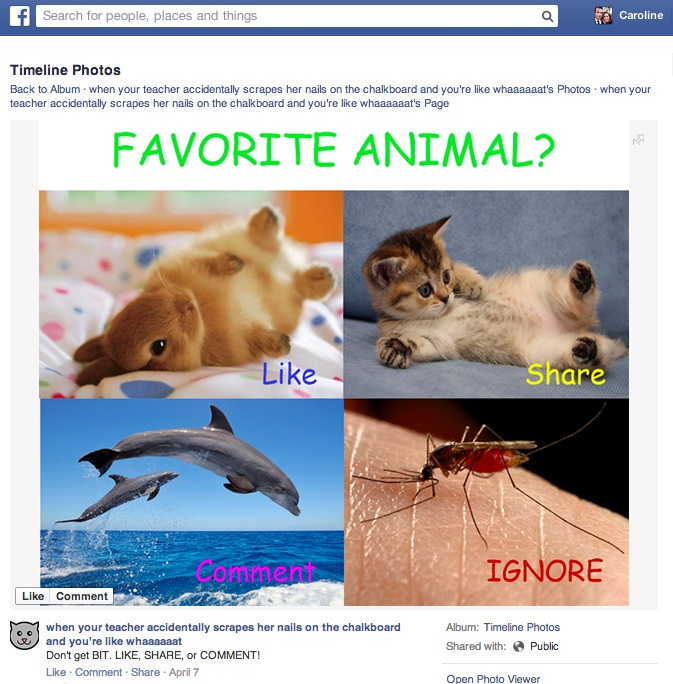By Erich Owens, Software Engineer, and Chris Turitzin, Product Manager
The goal of News Feed is to deliver the right content to the right people at the right time so they don’t miss the stories that are important and relevant to them.
Today we are announcing a series of improvements to News Feed to reduce stories that people frequently tell us are spammy and that they don’t want to see. Many of these stories are published by Pages that deliberately try and game News Feed to get more distribution than they normally would. Our update targets three broad categories of this type of feed spam behavior.
Like-baiting
“Like-baiting” is when a post explicitly asks News Feed readers to like, comment or share the post in order to get additional distribution beyond what the post would normally receive.
People often respond to posts asking them to take an action, and this means that these posts get shown to more people, and get shown higher up in News Feed. However, when we survey people and ask them to rate the quality of these stories, they report that like-baiting stories are, on average, 15% less relevant than other stories with a comparable number of likes, comments and shares. Over time, these stories lead to a less enjoyable experience of Facebook since they drown out content from friends and Pages that people really care about.
The improvement we are making today better detects these stories and helps ensure that they are not shown more prominently in News Feed than more relevant stories from friends and other Pages. This update will not impact Pages that are genuinely trying to encourage discussion among their fans, and focuses initially on Pages that frequently post explicitly asking for Likes, Comments and Shares.

Frequently Circulated Content
People and Pages on Facebook frequently reshare great content, but people tell us there are occasionally instances where photos or videos are uploaded to Facebook over and over again. We’ve found that people tend to find these instances of repeated content less relevant, and are more likely to complain about the Pages that frequently post them. We are improving News Feed to de-emphasize these Pages, and our early testing shows that this change causes people to hide 10% fewer stories from Pages overall.
Spammy Links
Some stories in News Feed use inaccurate language or formatting to try and trick people into clicking through to a website that contains only ads or a combination of frequently circulated content and ads. For instance, often these stories claim to link to a photo album but instead take the viewer to a website with just ads.
By measuring how frequently people on Facebook who visit a link choose to like the original post or share that post with their friends, we’ve been able to better detect spammy links. The update we are making today improves News Feed to reduce cases of these spammy links, and in our early testing we’ve seen a 5% increase in people on Facebook clicking on links that take them off of Facebook – this is a big increase in the context of News Feed and is a good sign that people are finding the remaining content in their News Feed more relevant and trustworthy.
Will this affect my Page?
The vast majority of publishers on Facebook are not posting feed spam so they should not be negatively impacted by these changes, and, if anything, may see a very small increase in News Feed distribution.
A smaller set of publishers who are frequently and intentionally creating feed spam will see their distribution decrease over the next few months. We’re making these changes to ensure that feed spam content does not drown out the content that people really want to see on Facebook from the friends and Pages they care about.